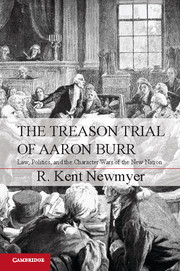Book contents
- Frontmatter
- Contents
- Acknowledgments
- Introduction
- Chronology of the Conspiracy and Associated Trial Proceedings
- Prologue A Mind-Jostling Trial
- 1 Jefferson and Burr on the Road to Richmond
- 2 Jefferson and Marshall Square Off
- 3 Legal Theater in Richmond
- 4 Treason Law for America
- 5 Judging the Judge
- Epilogue
- Index
- References
4 - Treason Law for America
The Lawyers Grapple
Published online by Cambridge University Press: 05 October 2012
- Frontmatter
- Contents
- Acknowledgments
- Introduction
- Chronology of the Conspiracy and Associated Trial Proceedings
- Prologue A Mind-Jostling Trial
- 1 Jefferson and Burr on the Road to Richmond
- 2 Jefferson and Marshall Square Off
- 3 Legal Theater in Richmond
- 4 Treason Law for America
- 5 Judging the Judge
- Epilogue
- Index
- References
Summary
“To a man of plain understanding it would seem to be a matter of little difficulty to decide what was meant in the constitution by levying of war; but the subtleties of lawyers and judges, invented in times of heat and turbulence, have involved the question in some obscurity.”
Judge William Cranch, dissenting in Bollman“A degree of eloquence seldom displayed on any occasion has embellished a solidity of argument and a depth of research by which the court has been greatly aided in forming the opinion it is about to deliver.”
John Marshall, Opinion delivered on August 31, 1807Although the Court’s second decision in Bollman (the first having dealt only with the question of whether it could issue a writ of habeas corpus) and U.S. v. Burr are regularly cited as foundational rulings on American treason law, the decisions taken singularly and in tandem are difficult to unscramble. Take Bollman for example. It was the first treason case to be decided by the Supreme Court, in contrast to the circuit court decisions in the 1790s. This fact alone entitles it to the prominent place it occupies. Nevertheless, several factors detract from its authority as a precedent. For one thing, the defendants, Bollman and Swartwout, were only indirectly connected with Burr’s enterprise, which meant that the facts did not allow counsel to argue the doctrinal questions fully. In addition, the decision was rendered by only four justices, who were themselves divided over some of the key issues. Whether for this reason or not, Marshall’s opinion, while it freed the prisoners, was not clear as to the meaning of “levying war” in Article III, Section 3. Therefore, rather than guiding the arguments in U.S. v. Burr in Richmond, the Bollman opinion became the central point in dispute.
As an authoritative statement of treason doctrine, U.S. v. Burr has its own disabilities, the main one being that the chief justice on circuit was speaking as a trial judge. As a result, his doctrinal pronouncements, as he admitted several times in the course of the trial, were technically bounded by the Supreme Court’s decision, and by his own opinion for the majority, in Bollman (despite its ambiguity). The result was that lawyers on both sides in Richmond put their own spin on Marshall’s Bollman opinion and of course urged him to say that he had said what they said he said.
- Type
- Chapter
- Information
- The Treason Trial of Aaron BurrLaw, Politics, and the Character Wars of the New Nation, pp. 107 - 142Publisher: Cambridge University PressPrint publication year: 2012

